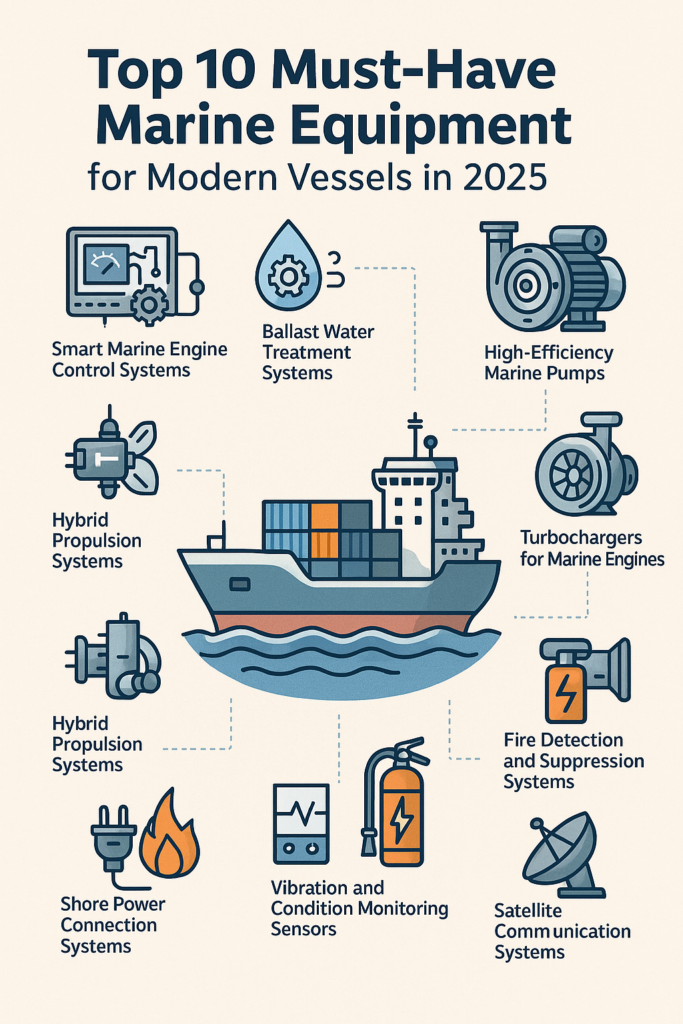In 2025, the maritime industry is entering a new era of innovation, where efficiency, sustainability, and automation define success at sea. Whether you’re a shipowner, fleet manager, or procurement officer, equipping your vessel with the right technology is critical. Here are the top 10 marine equipment essentials every modern ship needs in 2025.
⚓ 1. Smart Marine Engine Control Systems
Say goodbye to outdated analog panels. Today’s vessels need intelligent engine control units (ECUs) that provide real-time diagnostics, remote monitoring, and fuel optimization through AI and IoT integration.
Why it matters: Enhances operational efficiency, prevents costly breakdowns, and reduces emissions.
🌊 2. Ballast Water Treatment Systems (BWTS)
With environmental regulations like the IMO’s Ballast Water Management Convention in effect, BWTS is now mandatory. UV, electro-chlorination, and filtration technologies help vessels meet compliance standards while protecting marine ecosystems.
Why it matters: Avoids legal penalties, reduces ecological impact, and enables global operations.
🧭 3. Integrated Bridge Systems (IBS)
Combining radar, GPS, ECDIS, AIS, and autopilot, IBS creates a streamlined digital navigation hub. Modern IBS offers touchscreen interfaces and remote diagnostics, preparing vessels for semi-autonomous operation.
Why it matters: Improves navigational accuracy, boosts safety, and simplifies bridge operations.
🔧 4. High-Efficiency Marine Pumps
From ballast handling to bilge management, pumps are the workhorses of any vessel. Modern marine pumps feature anti-corrosion coatings, variable-speed drives, and built-in fault detection.
Why it matters: Saves energy, reduces repair costs, and increases reliability in harsh environments.
💨 5. Turbochargers for Marine Engines
Next-gen turbochargers increase engine efficiency and reduce fuel consumption. Some models now include variable geometry and digital boost control for adaptive performance at sea.
Why it matters: Delivers more power with less fuel and ensures compliance with emission standards.
🔋 6. Hybrid Propulsion Systems
Fuel prices and green shipping regulations are pushing hybrid marine propulsion into the mainstream. These systems combine diesel and electric power for flexible operation.
Why it matters: Cuts fuel costs, reduces carbon footprint, and future-proofs your vessel.
🔌 7. Shore Power Connection Systems
More ports now require ships to switch off engines and use onshore electricity. Shore power systems allow seamless integration between ship and dockside power supply.
Why it matters: Reduces emissions in port, meets environmental requirements, and lowers noise pollution.
🔍 8. Vibration and Condition Monitoring Sensors
Predictive maintenance is a must in 2025. Vibration sensors and condition monitors detect early signs of wear in engines, bearings, and other critical components.
Why it matters: Prevents equipment failure and minimizes unscheduled downtime.
🔥 9. Fire Detection and Suppression Systems
Advanced fire systems now include smart smoke detectors, heat sensors, and automatic CO₂ or foam suppression. Integration with ship control systems ensures rapid response.
Why it matters: Protects life and cargo, meets IMO safety regulations, and reduces insurance risk.
📡 10. Satellite Communication Systems
Reliable internet is no longer a luxury. High-speed VSAT and LEO satellite systems keep crew connected and enable real-time data transfer between ship and shore.
Why it matters: Enhances crew welfare, improves fleet coordination, and supports remote troubleshooting.
